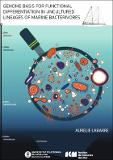Por favor, use este identificador para citar o enlazar a este item:
http://hdl.handle.net/10261/225375COMPARTIR / EXPORTAR:
 SHARE
BASE SHARE
BASE
|
|
| Visualizar otros formatos: MARC | Dublin Core | RDF | ORE | MODS | METS | DIDL | DATACITE | |

| Título: | Genome basis for functional differentiation in uncultured lineages of marine bacterivores |
Autor: | Labarre, Aurélie CSIC ORCID | Director: | Massana, Ramon CSIC ORCID | Fecha de publicación: | nov-2020 | Editor: | Universidad Politécnica de Cataluña CSIC - Instituto de Ciencias del Mar (ICM) |
Resumen: | [EN] In the vast network of the ocean, microbes are abundant and unevenly distributed. As an important microbial component, the protists play a key role in global biogeochemical cycles and contribute to the recycling of nutrients necessary to sustain life on Earth. These unicellular eukaryotes exist and function as primary producers (drivers of photosynthesis), decomposers, parasites or as trophic linkers in aquatic food webs. Phagotrophic species, which acquire nutrition through feeding on other organisms, are commonly understudied due to the difficulty in culturing them. The recent characterization of their genomic and metabolic diversity starts to unveil their great ecological relevance in the oceans. In this dissertation, we focused on heterotrophic flagellates, the main bacterial grazers in marine systems, and especially on the MArine STramenopile (MAST) lineages that display numerous uncultured and, therefore, undefined species. The aim was to elucidate their ecological importance in marine food webs by understanding their presumed trophic strategy: phagocytosis, a process only well characterized in animals as an immune system response.
We first attempted to provide new reference genomes of MAST species using single cell genomic sequencing and a co-assembly approach. We assembled 15 draft genomes from different MAST species, and predicted their gene repertoire with the objective to characterize specific genes related to their trophic strategy. Our comparative genomics analysis indicated that all MAST species were phagotrophs. We then targeted peptidases involved in prey digestion as well as proton pumps for vacuole acidification, but we did not find preferential genes specific for phagocytosis. In addition, this study revealed the relevant presence of rhodopsin proteins that may contribute in the acidification of the phagolysosome. In the second chapter, we did a functional study of MASTs using metatranscriptomics in order to gain access to their gene expression within the natural environment. To do so, we prepared a microcosm with a sample from the Mediterranean Sea where we followed the cell growth of a natural community in the dark, aimed to enrich for heterotrophic flagellates and therefore phagocytosis. Using the previously established reference genome collection of a few MASTs, we were able to target the MAST reads in the metatranscriptome and analyze the expression profile of genes involved in phagocytosis for a couple of MAST-4 species. Cathepsins and other digestive enzymes were highly expressed when bacterial consumption was observed. Finally, a similar experiment was conducted with a cultured organism, Cafeteria burkhardae, a cosmopolitan heterotrophic flagellate that proved to be a good model to study bacterivory within the Stramenopiles. Results demonstrated distinct expression profiles depending on the growth phase of this species. Upregulated genes at the Exponential phase were related to DNA duplication, transcription, translation, and phagocytosis, whereas upregulated genes in the Stationary phase were involved in signal transduction, cell adhesion and lipid metabolism. Phagocytosis genes, like peptidases and proton pumps, were highly expressed and could be used to target this ecologically relevant process in marine ecosystems. This thesis contributes to the understanding of the community of marine bacterial grazers, which include the smallest phagotrophs in the ocean, with a focus on their functional behavior within the natural and complex protistan assemblage [ES] En la vasta y compleja red del océano, los microbios son abundantes y están desigualmente distribuidos. Como uno de los componentes microbianos importantes, los protistas juegan un papel clave en los ciclos biogeoquímicos globales y contribuyen al reciclado de nutrientes necesarios para mantener la vida en la Tierra. Estos eucariotas unicelulares funcionan como productores primarios (realizando la fotosíntesis), descomponedores, parásitos o conectores tróficos en las redes tróficas acuáticas. Las especies fagotróficas, que adquieren nutrición al alimentarse de otros organismos, han sido poco estudiadas debido a la dificultad de cultivarlas. Sin embargo, la reciente caracterización de su diversidad genómica y metabólica comienza a desvelar su gran relevancia ecológica en los océanos. En esta tesis doctoral, me he centrado en los flagelados heterótrofos, considerados los principales depredadores de bacterias en los sistemas marinos, y especialmente en los linajes MArine STramenopiles (MAST) que muestran numerosas especies no cultivadas y, por lo tanto, indefinidas. El objetivo es dilucidar su importancia ecológica en las redes tróficas marinas mediante la comprensión de su estrategia trófica: la fagocitosis, un proceso bien caracterizado únicamente en animales como una respuesta del sistema inmunológico. [...] |
Descripción: | Memoria de tesis doctoral presentada por Aurélie Labarre para obtener el título de Doctora en Ciencias del Mar por la Universitat Politècnica de Catalunya (UPC), realizada bajo la dirección del Dr. Ramon Masana del Institut de Ciències del Mar (ICM-CSIC).-- 247 pages | URI: | http://hdl.handle.net/10261/225375 |
| Aparece en las colecciones: | (ICM) Tesis |
Ficheros en este ítem:
| Fichero | Descripción | Tamaño | Formato | |
|---|---|---|---|---|
| Labarre_Thesis_2020.pdf | 12,15 MB | Adobe PDF |  Visualizar/Abrir |
CORE Recommender
Page view(s)
239
checked on 19-abr-2024
Download(s)
302
checked on 19-abr-2024
Google ScholarTM
Check
NOTA: Los ítems de Digital.CSIC están protegidos por copyright, con todos los derechos reservados, a menos que se indique lo contrario.
